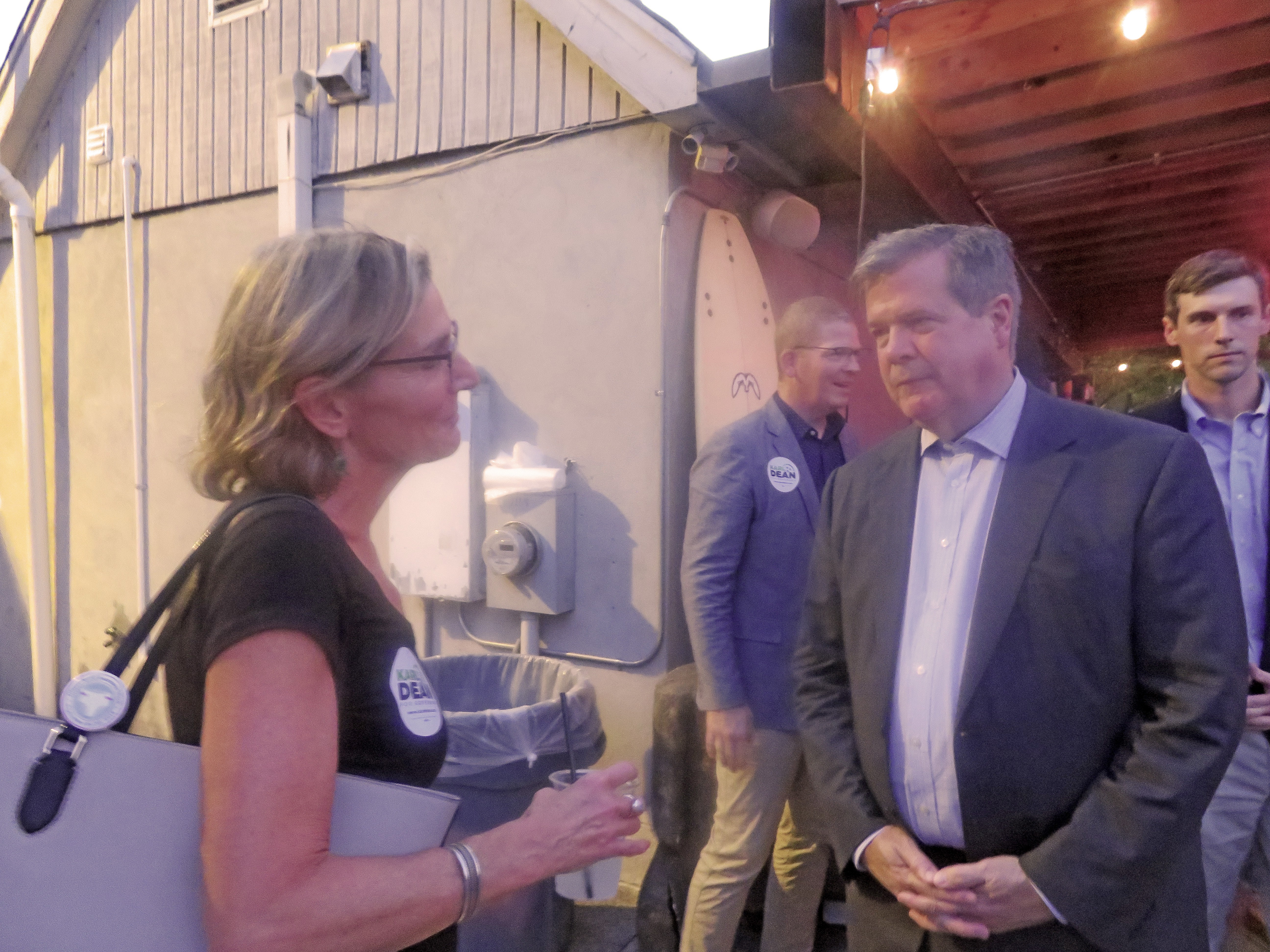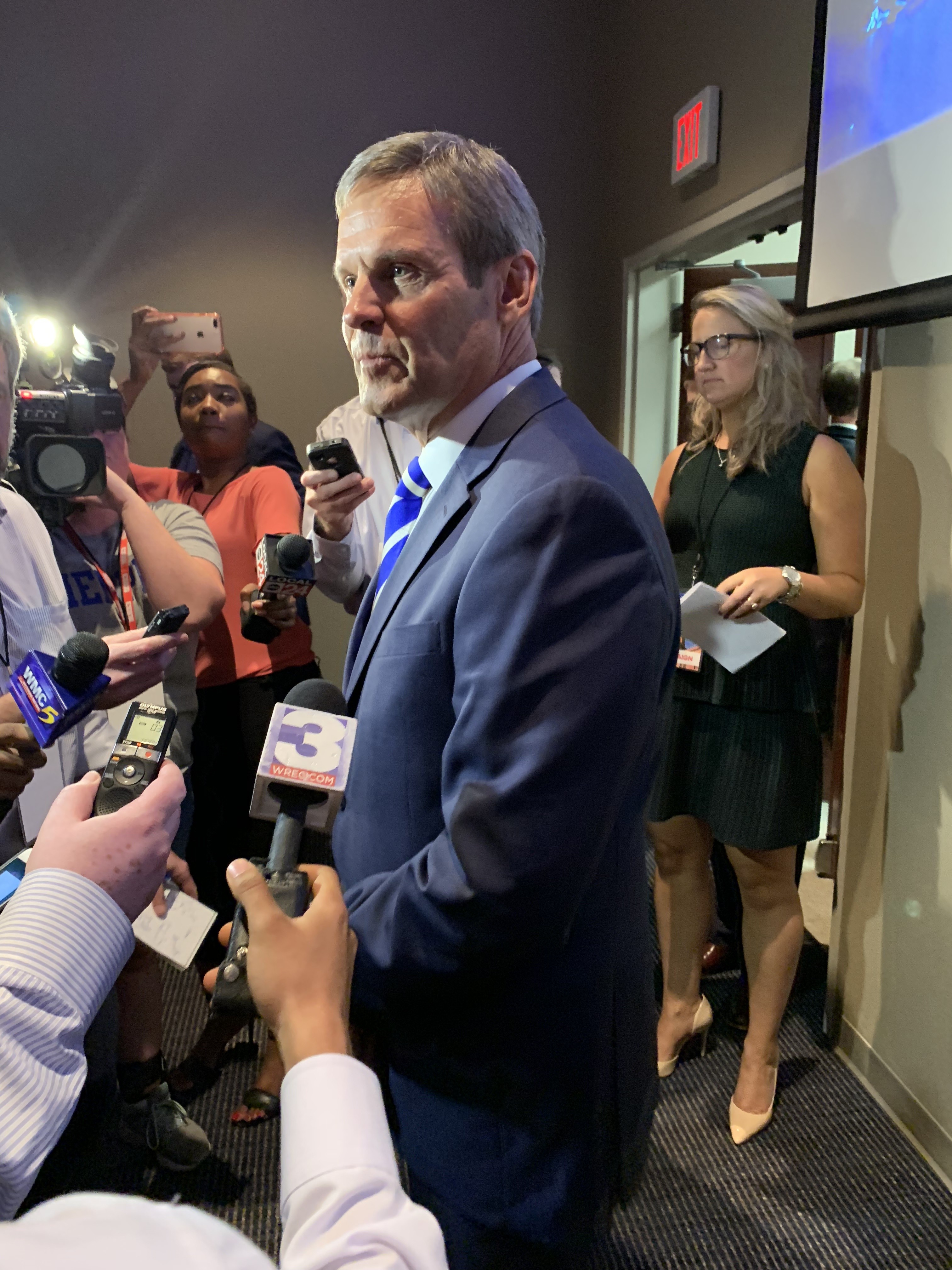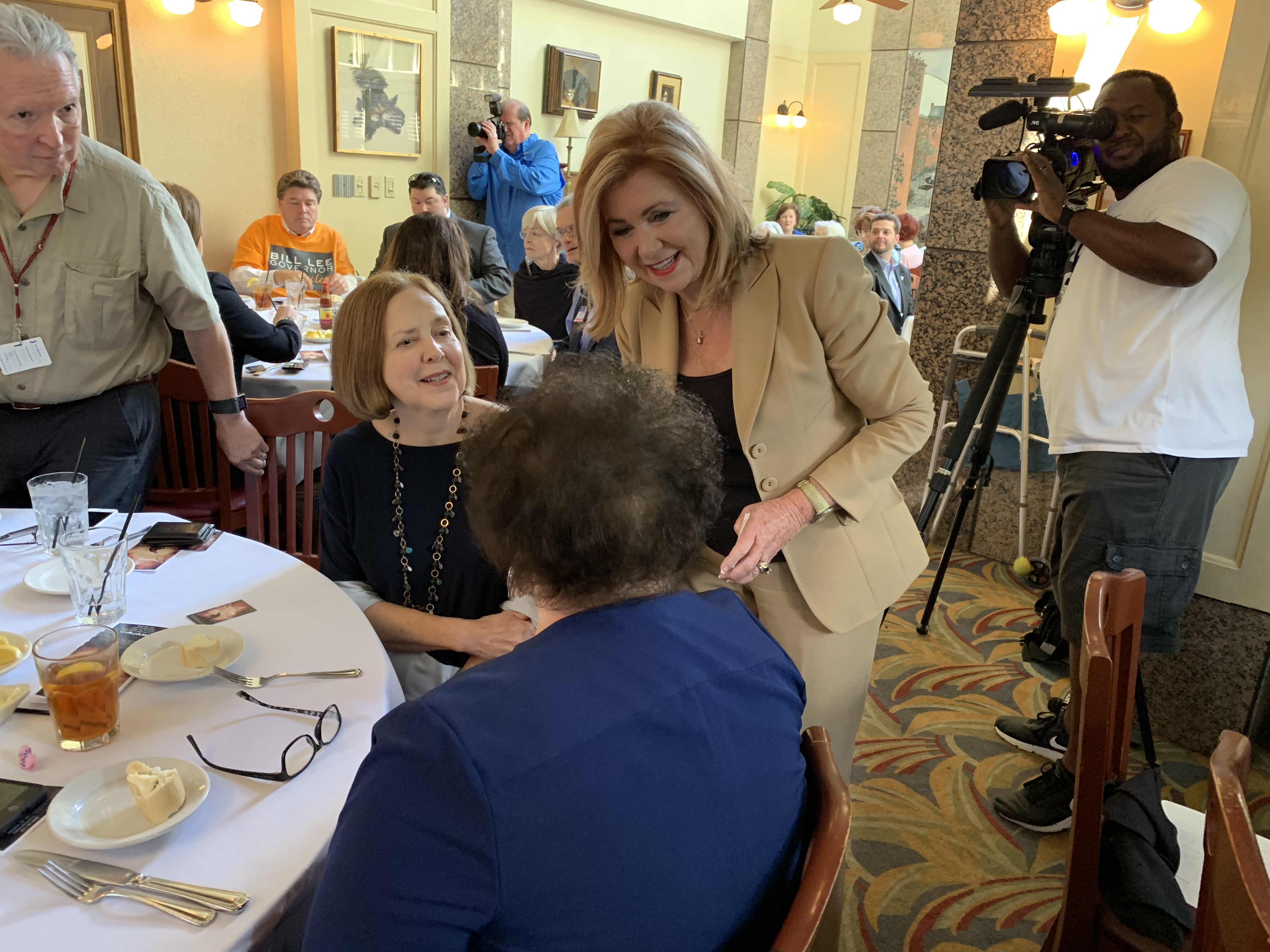This was the Week of Coin Flips for serious followers of politics locally. On Tuesday evening, one night after Donald Trump had held one of his patented rallies in Johnson City, some 500 miles away, the President came all the way to suburban Southaven for a sequel. But simultaneously, the two major-party candidates for Governor — Democrat Karl Dean and Republican Bill Lee — were holding their one and only West Tennessee debate at the University of Memphis.
It was a dilemma: Which event to go to?
For the deep-of-pocket types, especially those whose political sympathies can run in more than one direction, there was an even more challenging choice on Wednesday, the next night. Of the four candidates running in the top statewide races, three (count ‘em, 3) held big-ticket fundraisers in Memphis.  JB
JB
Dean at Railgarten
The aforesaid Dean was feted by a group of lawyers at the Crescent Club, Democratic Senate candidate Phil Bredesen was the beneficiary of an event at the home of Ron Belz, and GOP Senate candidate Marsha Blackburn had a fundraiser not three blocks away at what her invitation referred to as “the historic home of Dr. George Nichopoulos” on Cottingham Place.
Dr. George Nichopoulos, it will be remembered, was the personal physician of the iconic late singer Elvis Presley. Deceased himself since 2016, “Dr. Nick” was at the center of serious controversy, stemming from his role in prescribing uppers and downers to the King, and ultimately was stripped of his medical credentials. That fact made the location of Wednesday night’s fundraiser the subject of gibes from Bredesen supporters who note that legislation sponsored by Blackburn may have contributed to the over-supply of opioids in society at large during the last few years.
Dean vs Lee
Of the two Tuesday night events, the more sedate by far was gubernatorial debate at the UM, sponsored by The Commercial Appeal, WMC-TV, and the League of Women Voters, among others. Both Dean and Lee were in good form, and the choice of a winner for most observers probably hewed fairly closely to their partisan loyalties.
Rhodes College political science professor Michael Nelson had a take on the debate that reasonably well described the difference between the two contenders. It was a case of Agenda (Dean) vs. Personality (Lee), said Nelson, who maintains (correctly) that, inasmuch as ultimately you vote for a person, the two factors tend to balance out in any fair metric.
Unsurprisingly, the go-to guy for issues per se was former Nashville Mayor Dean, whose answer to the first question of the night, about Medicaid expansion, was a resolute call for the state’s acceptance of the annual $1.5 billion offered by the federal government under the Affordable Care Act and an unequivocal statement that the Republican-controlled state government has committed a major mistake in blocking Tennessee’s participation in the Act so far.
Failure to accept the proffered aid,
 JB
JB
Lee with reporters
said Dean, had left 300 thousand Tennesseans needlessly uninsured, had turned away by now some $4 billion in funding due Tennessee without saving the state’s taxpayers a penny and had resulted in financial hard times and instances of closing for the state’s hospitals.
Lee has an undoubted ability to suggest a solid character through both word and deed. That fact, plus an agreeable square-jawed look and a reassuring manner, was a key to his come-from-behind victory over more highly touted candidates in the Republican primary, and it came through again both on stage and to a watching television audience. He demurred on the value of Medicaid expansion, contending on the basis of his own experience as the owner of a construction and equipment company employing some 1200 people that the state’s existing medical-insurance system was “fundamentally flawed,” and said he would “execute a different plan.”
Though he would provide a bit more reasoning during a Q-and-A with reporters after the debate, Lee has never quite articulated a definitive remedy of his own for the shortcomings of medical coverage for the masses of Tennesseans. In this respect, as in most others, he seems content to offer his own evident sincerity and good intentions as alternatives to sketched-out specifics.
Aside from the issue of Medicaid Expansion, there were few dramatic differences between the two candidates,though Dean posited the lack of Medicaid expansion as a major factor retarding progress in several other spheres — including industrial recruitment and educational achievement — and implicated it as a problem exacerbating the state’s unresolved transit issues.
The two candidates agreed that TNReady in its present form was failing , that there should be more emphasis on
 JB
JB
Blackbun at Owen Brennan’s on Wednesday
vocational education, and that alternatives to the state’s ASD handling of “priority” (i.e., failing) schools like Shelby County Schools’ home-grown IZone schools are promising.
There was one moment of exuberant reaction from the audience following the two candidates’ discussion of MeToo and gender issues in general. Lee worried about the prospect of divisiveness, but Dean went full tilt for equalizing incentives and opportunities for women and for making Tennessee the friendliest and best state for women.”
Although Dean followed up his good showing with the previously mentioned fundraiser on Wednesday, followed by a meet-and-greet at Railgarten, he is regarded at this point as sill behind in the polls to Lee, who has the Red-State factor in his favor.
Trump at Southaven
Although, as usual, the President’s Tuesday night rally at the Landers Center in Southaven, ostensibly to lobby for Republican Senator Cindy Hyde-White’s reelection, was a parade of his Greatest Hits talking points, one moment in particular would strike the entire nation’s attention.
That was Trump’s employment of verbal mockery to question the bona fides of Dr.Christine Blasey Ford, whose accusations of sexual assault against Trump Supreme Court designate Brett Kavanaugh would throw that nomination into doubt.
Riffing on the weak points of Ford’s memory of the 36-year-old incident, Trump reeked with sarasm, doing his obvious best to make Ford appear to be not only an unreliable but a dishonest accuser. He characterized the Senate Democrats contesting Kavanaugh’s nomination as practicing a strategy of “resist, demolish, destroy, and delay.”
The capacity crowd at Landers responded with cries of “Kavanaugh, Kavanaugh, Kavanaugh!” and “We Want Kavanaugh!”
Those were not the only chants to be heard from the assembly at Southaven. There were such blasts from the past as “Lock Her Up!” in relation to Trump’s erstwhile Democratic presidential opponent. And there were numerous refrains of “Trump! Trump! Trump!” and “Build That Wall!” (the latter a reference to the President’s dogged insistence on erecting a 2000-mile barrier on the nation’s southern border.
It was a typical Trump performance — not so much a speech as a performance in which he aroused and stroked the emotions of his base. Along the way he boasted a litany of claimed achievements — including tax cuts, a booming economy,rising employment, his new trade deal with Mexico and Canada, his opening to North Korea, and the opening of an American embassy in Jerusalem. He blasted such adversaries as the aforementioned Hillary Clinton, Senator Richard Blumenthal, the lawyer Michael Avenatti, and Democrats in general.
The President went so far as to suggest that the Democratic Party (or “Democrat Party,” as he says it) is a threat to the future of Medicare, although Democrats by and large seem committed to the expansion of Medicare, the creation of Democratic President Lyndon Johnson. And Trump tried to link Republicans as a whole to the continuation of insurance coverage for people with previous medical conditions, though there is serious sentiment among GOP opponents of Obamacare to forgo that aspect of the Affordable Care Act.
As usual in the case of a Trump rally, truth was not the essential agreement. Rather, it was raw emotion, stoked by preambles of patriotic music and fueled by multiple helpings of impassioned rhetoric from the President.
Hifh
There was no doubting, however, that Trump can wow a crowd like few others. He concluded, as usual, with a promise that, under his policies, America would be “wealthy again…strong again…safe again…great again.”